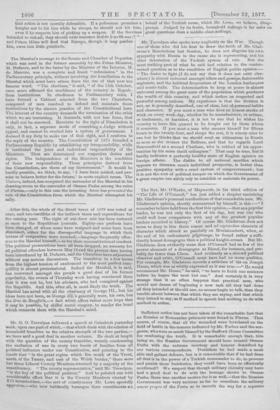The Marshal's message to the Senate and Chamber of Deputies,
which was read in the former assembly by the Prime Minister, M. Dnfaure, and in the latter by the Minister of the Interior, M. de Marchre, was a complete and frank " submission " to the Parliamentary principle, without involving the humiliation to the Marshal which must have arisen from the use of that now too famous word. "The elections," it said, " of the 14th October, once more affirmed the confidence of the country in Repub- lican institutions. In obedience to Parliamentary rules, I have formed a Cabinet selected from the two Chambers, composed of men resolved to defend and maintain those institutions by the sincere practice of the Constitutional laws. The interest of the country demands the termination of the crisis which we are traversing. It demands, with not less force, that it shall not be renewed. Recourse to the right of Dissolution is only, in fact, a supreme mode of consulting a Judge without appeal, and cannot be erected into a system of government. I deemed it my duty to make use of that right, and I conform to the reply of the country. The Constitution of 1875 founded a Parliamentary Republic by establishing my irresponsibility, while it instituted the joint and individual responsibility of the Ministers. Thus are determined our respective duties and rights. The independence of the Ministers is the condition of their new responsibility. These principles derived from the Constitution, are those of my Government." It would be hardly possible, we think, to say, 'I have been misled, and pro- mise to behave better for the future,' in more explicit terms. The Univers, indeed, has compared the surrender of the Marshal in his drawing-room to the surrender of Osman Pasha among the ruins of Plevna,—only in this case the investing force has prevented the ruin of the Constitution from which the Marshal attempted his sally.






































 Previous page
Previous page